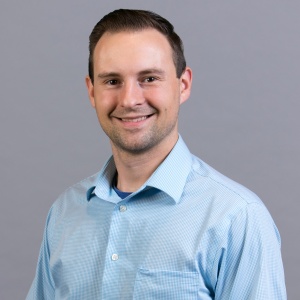
On any given day, Greg Woods, a program specialist with the Greater Iowa Chapter of the Alzheimer’s Association, is reaching out to help fellow Iowans cope with some of life’s most challenging circumstances. Many of those Iowans meet Woods face-to-face, while some simply hear his voice on the airwaves.
A 2015 graduate of the University of Iowa College of Public Health’s Master of Public Health program in community and behavioral health, Woods is based in the Alzheimer’s Association’s Fort Dodge office, serving Boone, Calhoun, Cerro Gordo, Franklin, Greene, Hamilton, Hancock, Hardin, Humboldt, Kossuth, Marshall, Pocahontas, Story, Webster, Winnebago, Wright, and Worth counties in north central Iowa.
“I cover the middle part of Iowa from Highway 30 up to the Minnesota border, so I travel quite a bit from county to county,” Woods, a Newton, Iowa, native, says. “I love building relationships in all of these communities and getting to know how each town is different.”
The work includes helping out with support groups, giving educational talks, and training caregivers. Every day is different, he says, and the need for the organization’s services is enormous–and growing.
“There are more than 65,000 Iowans who have the disease right now, and Iowa has the seventh-highest death rate from Alzheimer's in the U.S.,” he says. “Between all the counties of Iowa and a few surrounding states' counties, there are just six program specialists at the Alzheimer's Association to cover 106 counties.”
To extend the reach of a limited staff, Woods drew upon his background in radio broadcasting to devise a plan to better connect with rural Iowans – “the demographic that most needs our services.” That’s how “The Mind Boggles," a weekly radio show that airs Wednesdays at 8:30 AM on AM1400 KVFD, was born.
The show is also on Facebook and Woods hopes to expand to more radio stations statewide.
“The Mind Boggles is not a show about Alzheimer's, although I do discuss that often,” Woods says. “It's a show that aims to bring people all the latest news on the brain, on aging, and the science behind it —regardless of a person's scientific background.
“Each week I talk to researchers or authors or specialists, and I try to let people know how some of the headlines they see might be pertinent to them,” he says. “It's a show that tries to address equal parts scientific news and science literacy, and the latter of those is incredibly important in this day and age.”
Woods credits his training in the UI College of Public Health with guiding him in his work and helping him connect Iowa audiences with the critical health information they need.
“While I was in school I studied a number of issues pertaining to rural Iowa, but in a broader sense, learning community outreach, how to foster grassroots efforts, crafting messages to reach different populations, those have all been extremely helpful skills to have,” he says. “Classes like Social Determinants of Health and Health Communication Campaigns helped prepare me for my future.”
